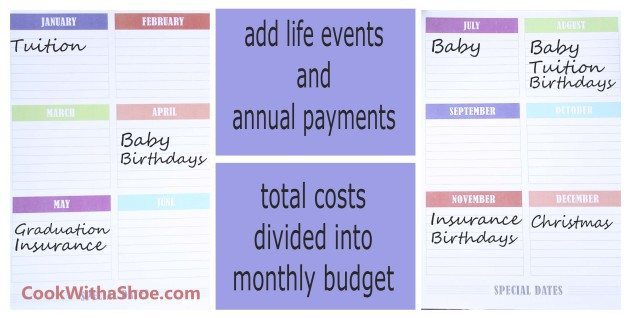Save time and money with my best-selling resources in Complete Change Your Finances Bundle.
Another empty calendar is before us. I always wonder what the coming year will hold and what events will fill up the calendar. Will it be a good one? What challenges will come my way? What will change my life in the coming months?
One thing that is very helpful to make some plans for the coming year regarding my budget. Do you need help drafting a monthly budget? I showed you how in A Budget in 7 Easy Steps.
First, think about any life events that you are already aware of and when they will happen. The events do not have to be yours per se to count, but if you are planning to go to or buy a gift for then you put it into the equation.
Weddings
Babies
Graduations
Vacations
Christmas
Birthdays
Moving
Here is a small snapshot of what my year looks like already. I can tell that it will be a busy one!
Then decide how much you want to (or can) spend for each occasion and if you will be able to absorb that amount in your monthly budget.
Personally, I can normally absorb 1 or 2 life events per month without needing to worry about coming up with the extra cash. I do something different if there are a lot of events in one month. Say, for example, that there are two weddings, one graduation and three babies who are due within May and June.
That is a lot happening in two months span and more than my budget can handle all at once.
In this case, I calculate how much I will spend for per event and add the five events together. Then I will divide the total by five and will include that final amount as part of my monthly budget starting in January, and for each consecutive month.
Dividing the total cost out over several months makes the amount I need to come up with a lot easier in a given time. Each month, I will put the money into my savings, earmarked for gifts, until I am ready to use it.
Between my husband's family andmine there are about 30 birthdays clustered throughout the year. I multiply the amount that we have agreed to spend on each person by how many family members there are. The total monetary amount is split and 1/12 of the amount is included in my budget each month. If there is only one birthday in a month, I will keep the rest of the money in savings until the month when there are four birthdays.

I do not always spend the full amount budgeted because of finding a great sale or making something by hand. The extra money can either be kept in the same account for the next event (i.e. birthdays), put into another sub-savings account or used for another purchase.
Vacation is another thing that you need to start saving for at the beginning of the year. The steps are the same; decide how much you will spend, divide the amount by how many months you have, and start putting the money aside in savings.
At our house, we pay cash for all of our vacations. Who likes to go on vacation, put everything on your credit card and then spend the next several months paying it off? Not me! Vacations are supposed to be relaxing; not a stalker that follows you for months after you have returned home.
Another yearly thing to consider is any semi-annual or annual insurance payments. Every month, I have a line item in my budget with 1/12 or 1/6 the total amount for that specific insurance payment that gets transferred into my savings. I use my sub accounts in Quicken to account for how much money is in the car insurance fund anytime.
Then when the bill comes due, I have all the money in my savings account and it is pretty simple to transfer the money into my checking account and pay the bill.
Medical deductibles or bills that are predictable are a few more things that are important to look at and workbackwards with how much you need to save each month to include that amount in your monthly budget.
For us, the first few months of the year are always expensive with medical expenses until the deductible kicks in, so I have to come atthose cost differently. I save throughout the year once the deductible has been met to be able to start the year off with money saved and ready to pay the bills as they come.
Tuition isbig expense that comes two-three times a year. I break down the cost of one payment into the four or five months that I have before it is due. Once the first one is covered, I start saving for the second tuition payment.
It is important to remember these four things when you do a yearly budget plan.
- Add the iteminto your monthly budget.
- Put the money into savings.
- Do not touch earmarked money.
- Stay within the amount that you had decided on when it is time to make the purchase!
Review 2014, were there any surprises that came about last year? Can you do something to prevent a similar stressful, surprise from popping up again in this coming year?
Do you need to increase the amount of your car repair fund or your medical savings? What about building an emergency fund? Were you always overspending in a certain category? Did you have more month than money?
Ask yourself some hard questions. What about that time was stressful? How did that event derail your finances? If you had a plan or money saved would that have made a difference?
Do not let life beat you up with its money punches. Start planning now for the things that you can control and the things that you know will happen (Christmas is always on 12/25- start saving now!).
The beginning of the year is also a good time to evaluate your whole financial situation. What financial goals do you have for 2015? Are you wanting to get out of debt or make progress towards savings? Do you need to get a new vehicle, like I do? Do you need to bring in some additional income? Are you wanting to take a vacation? What changes need to be made?
Write down these goals. If you are married, talk to your spouse about what you would like to change on your financial horizon. Make a plan on how you are going to accomplish your goals and set action steps to follow through.
Maybe you have a credit card with a balance. Set a date for when you want to have the card paid in full (6 months?) and then divide your balance amount by 6. Add that extra amount toyour your payment each month and you will be able to pay it off in record time, that is if you do not add any more charges to it.
As events or bills come up this year, you will not be scrambling to come up with a lot of cash at one time. Instead, these bills become just a simple inconvenience to be paid in that particular month.
So now you have a handful of ways to eliminate a budget crunch throughout the year. Put them into practice and see if the year goes a little bit smoother on the money side of the equation. All you need is some simple addition,multiplication and division, all of which can be easily done on any calculator.
Now it is your turn. Take 30 minutes to review what happened financially last year and what you can project for 2015. Doing this exercise now and splitting upthe amount of large purchases into a more manageable number in your monthly budget will result in better financial control with much less stress later in the year.
Do you have other budget breakers that you need to plan for accordingly? Tell me about it!
This post was shared at Simple Lives Thursdays.
Like this post? Check out all the rest in :
- How to Set Up A Budget Series

Hi! I’m Charissa. I’m on a mission to help hardworking women overcome money struggles and gain financial peace with a Biblical perspective so they can have the freedom to impact their families and communities. Ready to make some changes that will impact your finances in 2020? Click here to get a free worksheet to help you make it happen!







Another great list of recommendations, Charissa! Wonderful job!
Thank you Holly, I am glad that you found the list to be helpful!